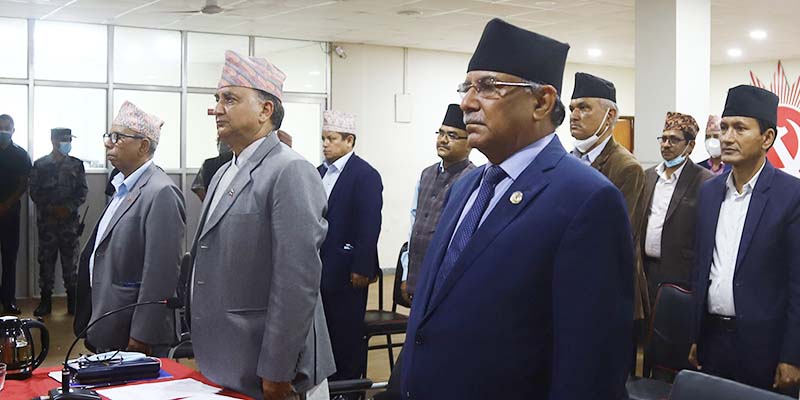NCP’s virtual meet with China’s party draws flak
KATHMANDU, JUNE 19
Nepal Communist Party (NCP) Co-chair Pushpa Kamal Dahal and chief of party’s Training Department Ishwar Pokharel were among 100 NCP leaders who took part in a meeting with leaders of ruling Communist Party of China via video conferencing.
NCP sources said the two parties exchanged their views on contemporary politics and their experiences, but the main opposition party Nepali Congress termed the exercise as CPC’s attempt to sabotage Nepal’s democratic, republican constitution.
“China does not have press freedom, freedom of expression, periodic election. China is ruled by one party but we have all these features of democracy. We respect China’s constitution and we expect them to respect our constitution as well,” Chief Whip of Nepali Congress Bal Krishna Khand said. He added that the ruling NCP was trying to sabotage democracy in Nepal by aligning with the CPC. CPC leaders had interacted with Madhav Kumar Nepal and some other NCP leaders also a few days ago.
CPC’s closeness with NCP worries not only political parties of Nepal but also political scientists and analysts. Political scientists said NCP leaders were trying to tilt towards China, but that could boomerang on them.
“There is a fundamental difference between NCP and CPC.
NCP rose to power thru democratic means whereas CPC follows one-party rule,” Baral said.
Political analyst Uddhab Pyakurel said NCP leaders’ love for CPC and Xi Jinping Thought was evidence that they were not committed to democracy and democratic socialism. “Liberal capitalism gives people chance to criticise the government, but state capitalism that China is practising has no space for criticism,” he added.
“Close interaction between leaders of NCP and CPC does not sound natural because of the differences that exist between the two countries. CPC follows different economic model. It does not enforce inclusion but unlike CPC, NCP follows inclusion within the party statute,”
Pyakurel said and added that NCP leaders’ praise of China’s anti-corruption measures were indications that CPC had been indoctrinating NCP leaders.
Another political analyst Puranjan Acharya said CPC’s attempt to look for a political force in Nepal who could listen to them and NCP’s desire to find a reliable supporter in the international arena had brought the two parties closer in recent years. He said NCP’s proximity to CPC had started to show new geopolitical consequences. According to Acharya, it is because of NCP’s closeness with CPC that NCP had chosen to maintain distance from India and some western powers.
Nepali Congress leaders Bal Krishna Khand, Udaya Shumsher Rana and Rastriya Prajatantra Party leader Kamal Thapa also condemned the interaction between the two parties.
“Bilateral relations between two nations are primarily conducted by two governments.
However, in the case of Nepal and China two ruling communist parties seem to be dictating the governments. Clubbing party and government policies is unprecedented and dangerous,” Rana tweeted.
Thapa termed it as a colonial exercise. “What will be the state of Nepal if other political parties also start taking economic assistance from like-minded foreign parties and let them train their cadres?” he wondered.
Two hundred NCP leaders and cadres had also listened to lectures from key CPC leaders for two days on Jinping Thought in September.
A version of this article appears in e-paper on June 20, 2020, of The Himalayan Times.






